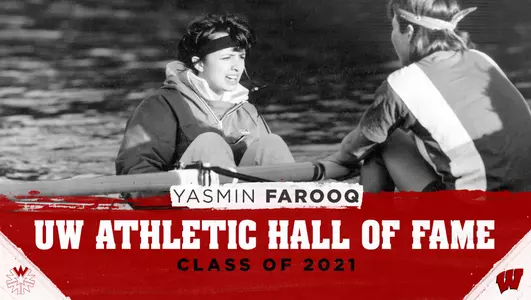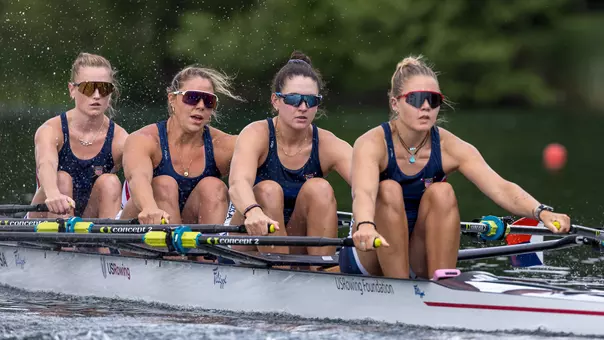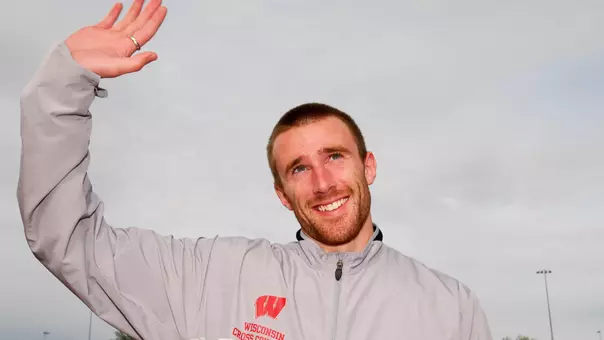
2021 UW Athletic Hall of Fame: Yasmin Farooq
June 18, 2021 | General News, Women's Rowing, Andy Baggot
Walking-on to rowing led to Olympics, television and an NCAA championship coaching career
 |
|
|
BY ANDY BAGGOT
UWBadgers.com Insider
MADISON, Wis. — The last time Yasmin Farooq attended a Wisconsin football game at Camp Randall Stadium was in 1988, so you'll have to forgive her lack of modern-day intel.
After all, the on-field product and the facility itself look nothing like they did 33 years ago when Farooq was a world-class student-athlete with the UW women's rowing program.
Don Morton, budget deficits, empty seats and embarrassing outcomes have been replaced by top-tier coaching, a strong investment portfolio, luxury seating and a well-stocked trophy case.
Farooq, part of the latest class of 12 inductees into the UW Athletic Hall of Fame, can't wait to see how much things have changed at her alma mater.
"Do they still do the Fifth Quarter?" she asked.
Yes.
"Do they still play the Bud Song?" she asked.
Yes.
Farooq was asked if she's familiar with Jump Around.
"What's that?" she asked.
Oh, boy.
It was suggested that Farooq just hang up the phone and do a Google search of the 23-year-old phenomenon that's regarded as one of the best traditions in college football.
"I'll totally check it out," she promised.
"YES," she texted a few minutes later, her reply accompanied by five exclamation points. "I love how truly everyone gets in on it."
Farooq will fit right in. Her high-energy personality not only helped make her one of the most accomplished UW rowing alums, it went a long way toward explaining why she's regarded as one of the best women's rowing coaches at the college level.
"Fun" and "smart" and "feisty" are words Sue Ela, the UW women's coach from 1979 to '97, used to describe Farooq.
"Passionate" and "super competitive" are among the ways Sarah (Gengler) Dahl described her friend and former teammate.
All are good ways to define a worthy Hall of Famer.
"I'm obviously deeply honored," Farooq said. "I would not be where I am today if I hadn't discovered, and been discovered by, Wisconsin rowing."
Farooq is a two-time Olympian (1992 and '96) from Waupun, Wis., who was a U.S. National Team member from 1989 to '96. She was part of four world championship performances, including Team USA's first gold medal in 1995. She also won five golds in U.S. National Championship races and was captain of the U.S. contingent in the '96 Summer Olympics.
During her time with the Badgers, Farooq won a national championship with the junior varsity eight boat in 1986 and was the team captain and Most Valuable Performer in 1988.
After retiring as an athlete in 1996, Farooq worked as a color analyst for NBC Sports for its Summer Olympics coverage of rowing before eventually taking her dynamic personality to coach at Stanford (2006 to '16) and Washington (2016 to the present).
She led Stanford to an NCAA title in 2009, the program's first in the sport. She subsequently guided Washington to the national championship in 2017, becoming the first rowing coach to win an NCAA crown in her first year. She's also the first coach to sweep the NCAA championships, doing so with the Huskies in 2017 and '19.
This is the same Farooq who knew nothing about crew when she showed up on the seventh floor of Sellery Hall as a freshman in 1984. A tennis player in high school, that's where she ran into several women who were headed to the old boathouse on Lake Mendota to try out for the rowing team. Their sales pitch to her was curious.
"You could be that little person who steers the boat," Farooq recalled with a laugh.
That would be the coxswain, whose job description may sound simple, but is anything but.
The coxswain sits in front of the racing shell, facing the eight rowers, and steers the vessel, as deftly as possible, along a course that measures 2,000 meters in college.
In her competitive heyday, Farooq could weigh no more than 99.24 pounds. That weight limit for coxswains is now 110.
Being a coxswain is so much more than steering a shell, though. You have to be part quarterback, part psychologist, part technician, part tactician and a full-blown leader. You have to have a respected voice. You have to be an effective communicator.
Dahl, who rowed with Farooq to a sixth-place finish in the 1992 Summer Games, said coxing an elite-level race is an "incredible" display of multi-tasking.
"You have to carry out the predetermined race plan," Dahl said. "At the same time, you're coaching. You have to speak in a voice that's not too frantic or excitable. It has to be just the right tone. And you have to steer the boat down the course.
"There's so much going on all at once. Once that race starts, it's six minutes of pulling a rabbit out of a hat. There's no time outs."
Ela said an elite coxswain has to be smart and have "a good sense of when to say it and how to say it."
That was Farooq. It was also Kim Santiago, who mentored Farooq and was a member of the U.S. Olympic Team in 1988 and '92.
Championship-winning coxswain are hard to find. Ela credited assistant coach Jane Ludwig for identifying Farooq's ideal frame and athleticism, then helping her build a foundation of technique and confidence with the novice and junior varsity boats.
"I feel so lucky that I learned to be a coxswain at Wisconsin because our coaches instilled in the whole team the importance of that role," Farooq said.
"She got some good footing, some good coaching, some good teammates that first year," Ela said of Farooq.
Put all the pieces together, Ela said, and they helped the charismatic Farooq "make boats go faster than they might have been capable of."
Dahl said Farooq was a quick study who had a winning aura about her.
"A good coxswain really makes a difference in the boat," Dahl said. "It's not just steering. They have to know how to pull eight people together and get them to row together."
Farooq said rowing is unlike any other team sport because there are no role players. Everyone must pull the same weight at the same time and be willing to suffer for one another.
"It is so intimate," she said. "You are in each moment, each breath, together and you're trying to repeat this motion — keeping the quality, the length and the power in every stroke as the suffering sets in — and when you persevere and succeed in that kind of situation, you feel an incredible sense of accomplishment and transcendence.
"To me the rush — and all rowers would say this — was always when everyone was in sync it felt like the boat is flying. I just loved what it felt like to make boats go as fast as possible. You live for that.
"It really does take nine people being perfectly in sync. That level of commitment — when you are suffering at an extremely intense level and your lungs and your legs are on fire — what is it that keeps you going? It's rarely for yourself. You're going to find another gear for your teammate that you'd never find for yourself."
Farooq earned a degree in broadcast journalism from UW — she interned for Van Stoutt in the sports department at WISC — and was working in promotions for a TV station in Eugene, Oregon, upon retirement. She claims she never thought about coaching.
"Not at all," she said.
That changed when Farooq and her husband, Roger Waterman, were driving to Bend, Oregon, for a weekend escape when they came upon a regatta on Dexter Lake. They stopped and, since this was shortly after the 1996 Summer Olympics, someone recognized Farooq.
"They asked me if I wanted to hang out with their master's rowing club," she said. "I wound up working with them casually for a decade."
Then came a call from Stanford. Farooq said she wasn't interested, but agreed to fly down to Palo Alto, California, and check things out. A new career was born.
Farooq said learning the ins and outs of college coaching was a "baptism by fire" because there was so much to learn. Turns out she was a quick study.
"The most rewarding part about coaching is helping young people develop as humans and discover their true potential," she said. "Rowing just happens to be the mechanism.
"I feel really fortunate to be in a sport that teaches teamwork and elevating one another at such a high level."
Ela, a UW Hall of Fame inductee in 2011, wasn't surprised that Farooq got into coaching.
"Not at all," Ela said. "Coxswains are like coaches in the boat."
Dahl felt the same way about her friend.
"She's really passionate about rowing," she said.













